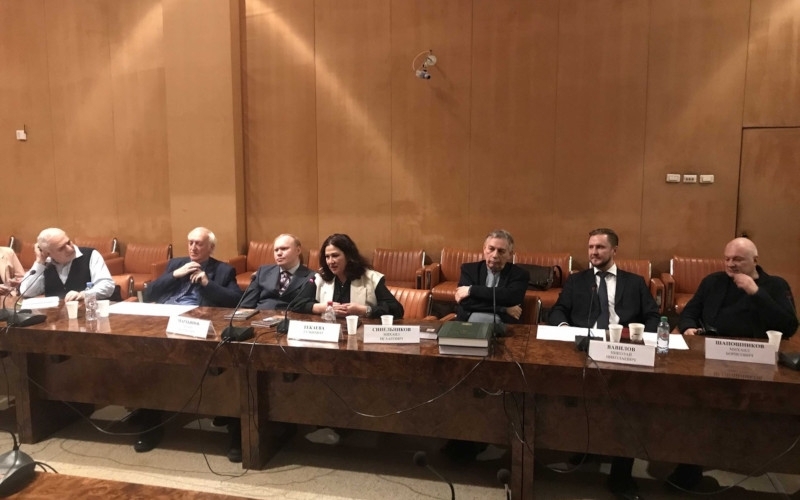
On February 26, 2021, the Eurasian Youth Assembly (EYA) organized an open discussion on the project “Valery Bryusov Poetry School”. The event took place at the headquarters of the Eurasian Peoples' Assembly, located in the famous Bryusov Lane in Moscow.
The project was initiated by Russian poet and literary critic Mikhail SINELNIKOV and Nikolai VAVILOV, Sinologist, Deputy Head of the General Secretariat of the Eurasian Peoples' Assembly for Youth Cooperation.
SINELNIKOV Mikhail Isaakovich - Russian poet, writer, translator and literary critic. Creator of the Russian Poetry Anthology, more than 20 author's collections of poetry translated into English, German, Bulgarian, Mongolian, Vietnamese and other languages.
Discussion on the project “Valery Bryusov Poetry School” brought together prominent figures in literature, cinema, science and art. The discussion on February 26 was attended by Academician RAS, Director of Institute of space research Lev ZELENY, Deputy Secretary General of the Eurasian Peoples' Assembly, Chairman of the Council for Cooperation in the Eurasian Media Space, President of the Eurasian Academy of Television and Radio Valery RUZIN, co-Chairman of the Union of Russian Writers Vadim TEREKHIN, Head of the Literature Department of the Museum of the Silver Age - Valery Bryusov's House Mikhail SHAPOSHNIKOV, poet, translator, member of the Union of Russian Writers' Elena PECHERSKAYA, journalist, poet, member of the Union of Russian Writers Lilia MILITSKAYA, President of the Foundation for Support, Preservation and Development of National and Cultural Heritage “International Shukhov Foundation” Leonid SHTERN, Head of the Moscow Society of Turkmen Culture Gulnabad TEKAEVA, poet, translator, literary critic Sergei ZENKEVICH, Director of the Institute for Oriental Studies of the Russian State Humanitarian University Ilya SMIRNOV,
Poet, prose writer, indologist Alexander SENKEVICH, Chairman of the Literary Council of Writers and Readers of the Eurasian Peoples' Assembly Margarita ALMUKHAMETOVA.
After the project presentation, the discussion participants supported Mikhail SINELNIKOV’s idea of to create the “Valery Bryusov Poetry School”, and noted that the school will help overcome the weakening influence of the Russian language on the literary work of the Eurasian peoples and the decline in the overall level of culture.
WHAT IS IMPORTANT
Lev ZELENY noted the appropriateness and fairness to name the school in honour of Valery Bryusov, a famous Russian poet, translator, playwright and literary critic. In addition, Abgar HAYRAPETYAN noted the significance of Bryusov's contribution to Russian poetry and literature, as well as his popularity in Armenia as a translator and populariser of Armenian literature in Russia. Sergei ZENKEVICH added that the school could become not only a platform for the development of skills, but also a forge of the intelligentsia, the preservation of a person of culture. He proposed to include the promotion of the artistic value and the role of the book and the word in the tasks assigned to the school. Elena PECHERSKAYA also supported this proposal. She noticed that watching the dying of a craft is like observing the dying of oneself, and therefore the school could cope with the task of transferring the craft to young people. On behalf of the Moscow Society of Turkmen Culture, its Head, Gulnabad TEKAEVA, spoke and expressed the willingness of the society to take an active part in the implementation of this project. During the meeting, Margarita ALMUKHAMETOVA spoke about the results of the Literary Council of Readers and Writers of the Eurasian Peoples' Assembly. She added that the school could become one of the activities of the Eurasian Poetry House in addition to festivals, poetry contests and concerts.
BRYUSOV Valery Yakovlevich (December 1, 1873 - October 9, 1924) is a Russian poet, translator, playwright and literary critic. He made a significant contribution to the development of Russian poetry, literature and the development of the form of verse. He is one of the founders of Russian symbolism - one of the largest phenomena in Russian literature and art of the early 20th century. Also he is widely known as a populariser of Armenian literary creation and a translator from Armenian into Russian.


